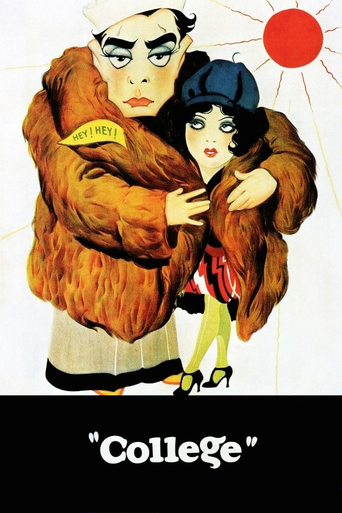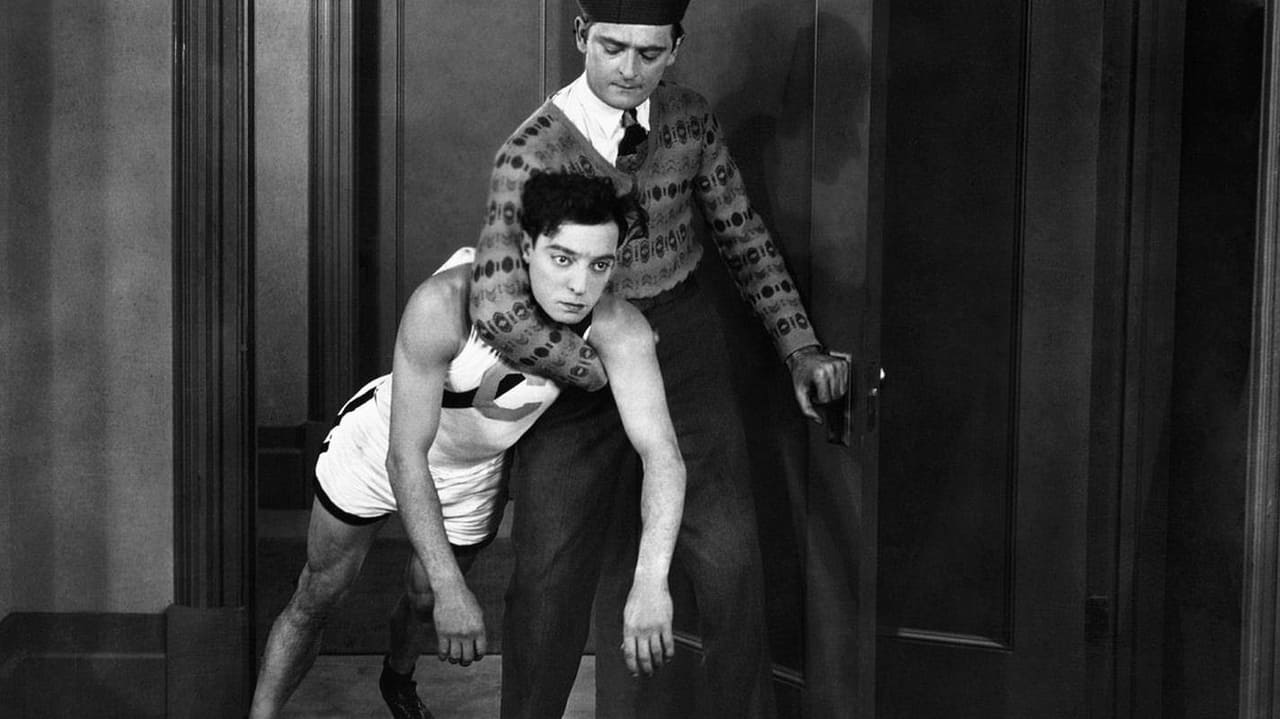MissyH316
Ah, the never-ending debate of academics vs. athletics. Well in this case, Buster proves he's a rare winner at both! While I very much enjoyed the film overall, I kept thinking back to a YouTube clip I saw of Lillian Gish introducing this movie (sorta like they do on TCM). Her commentary alone is what made me decide that this would be the then-next BK film I'd watch! She made the introduction in her usual gentle, elegant way, especially in giving some first-hand perspective to what nowadays would be a very "politically incorrect" scene. But when she made a comment to the effect of, "Poor Buster! Imagine how difficult it probably was for a great athlete like him to do so many athletic feats 'wrong'!", that was all *I* needed to hear! So does "poor Buster", the top academic student, win over the girl he loves with all his clumsy (and sometimes painful!) attempts at athletics? You wouldn't think so, but then again, efforts and results don't necessarily always follow a clear path. Remember "wax on, wax off"? ;-D
zardoz-13
The sophomoric 1927 Buster Keaton silent comedy "College" lacks the overall creativity of "The General" (1927), "Steamboat Bill, Jr.," (1928) and "The Cameraman" (1928). Buster's gags and routines are tame compared with the three aforementioned epics. Nevertheless, "College" isn't completely without merit. The irony, for example, is that the physically fit Buster plays a protagonist without any athletic ability until the villain endangers our hero's sweetheart. Like Charles Chaplin, Buster exploited incongruity as the source for his comedy. "College" is basically your boy wants girl, boy loses girl, and then boy wins girl nonsense. "On the sunkist slopes of the Pacific where land and water meetCalifornia" reads the opening title card. Rain pelts Union High School auditorium as people huddle under newspapers and umbrellas. The opening 10 minute-plus scene depicts Buster's high school graduation day "where the next step is either to go to college or go to work." Buster arrives at graduation with his mother. Although Ronald has brought an umbrella, his cheap $15 suit shrinks up on him as that he looks ridiculous. This gag and his problems closing an umbrella gag are clever and cute. This is the most non-traditional graduation because nobody wears caps and gowns. They had to otherwise everybody would have looked the same and we would never have seen Buster's suit shrink. All in all, this is the most thought out and calculated sequence in "College."Mary Haynesthe heroine--has a memorable introduction. The male students remove several coats that they had generously allowed her to bundle up in to avoid getting drenched. She is described as "the winner of every popular contest in which the boys were allowed to vote. When she receives his diploma, the principal predicts that she will fit in at Clayton College as she did at Union High School. Star athlete Jeff Brown (Harold Goodwin) appears amid fanfare. He is described "as a man who loved exercise so much that he has made many a girl walk home." When the principal hands Jeff his diploma, he notes that Jeff took seven years to earn it. Lastly, the principal congratulates Buster for being "the most brilliant scholar." Of course, everybody laughs at Buster because his suit has shrunken so much that the buttons on his vest have popped off and his sleeves have retreated virtually to his elbows. Buster alienates everybody at graduation with his anti-athletic speech. As the top student, he receives an honor medal. "The student who wastes his time on athletics rather than study show only ignorance." His words anger Jeff and the other fellows. "Future generations depend upon brains and not upon jumping the discus or hurdling the javelin." Mary (Anne Cornwall) criticizes Ronald. "When you change your mind about athletics then I'll change my mind about you." She rides away with Jeff.Mary enters Clayton College. Neither Ronald nor his mother can afford the tuition, so Ronald looks for a job so he can work his way through school. He gets a temporary job as a soda jerk clerk. He carries a picture of Mary around in his suitcase and boards in the dormitory. The soda clerk job doesn't last long because Ronald is afraid that Mary will see him in such a lowly job and ridicule him so he quits.Dean Edwards (Snitz Edwards) congratulates Ronald about his maturity. He praises him, "A boy like you can make this athlete infested college a seat of learning once more." Eventually, Ronald quits his soda jerk job when Mary enters the shop. Ronald decides he wants to take a try at sports. Ronald gets on the baseball team and his idiotic antics result in his team losing. Jeff and some guys catch him walking home from the disastrous baseball game and toss him on a blanket in the air. He sails so high that he can see an old battle axe dressing through her balcony window. Infuriated, she storms onto the balcony and swats at him with an umbrella. More umbrella buffoonery! He seizes the umbrella and floats up and down until he tears down a balcony and brings down the battle axe on it. Ronald tries out for track and other related athletics and again fails miserably. Pay close attention to these shenanigans because they play an important part in the conclusion. Looking for work, Buster masquerades as an African-American in a restaurant. The black paint on his face smears off when he is serving Jeff and Mary on a date. When the blacks discover that he's an imposter, they run him off. Eventually, the Dean summons our hero to his office and complains about Ronald's failing grades. "I took up athletics because the girl I love thinks I'm a weakling," Buster explains in his own defense. The Dean requests that the rowing coach make Buster the coxswain on the rowboat team. The coach, however, has other ideas and he slips Buster a mickey. Things don't work out for the coach and the person intended to replace Buster gulps the potion. The photography for the boat rowing race is incredibly good. One of the boats has the semi-profane name 'Damfino.' This too must have been pretty risqué for its day.Ultimately, Jeff shows his true antagonistic colors when he locks Mary in her dorm room and stays with her. She warns him that his being caught in her room will mean expulsion for both of them. Jeff points out that he has been expelled already. Mary calls Ronald for help and he responds with alacrity. The last nine minutes of "College" portray Ronald as an entirely different kind of guy and the ending is truly odd. Again, "College" is not top-notch Keaton, but it is worth watching and the DVD is available in a Kino International print on Genius Entertainment for under a dollar in some stores.
ackstasis
While this may seem a rather lightweight effort considering it came in the same year that produced 'The General (1927),' 'College' is an excellent little film in which Buster Keaton exploits the endless slapstick possibilities offered by sporting activities. Keaton plays Ronald, an unpopular bookworm whose public condemnation of athletics leads his girlfriend (Anne Cornwall) to dump him in favour of a more physically-capable jock (Harold Goodwin). In an attempt to win back the love of his life, Ronald enrolls himself in college and tries his hands at every sport in sight, with hilarious consequences. The two preceding sentences pretty much summarise the entire film. However, this inkling of a narrative is more than enough to open up a vast range of entertaining gags, and Keaton snatches a laugh at every opportunity.How do I begin to list my favourite moments from 'College?' Though some have complained of the repetitiveness of the sequence in which Keaton tries every athletics activity in the book, I thought it was the highlight of the film. The scenes follow a very strict comedic routine: first we see how it is supposed to be done, then we see Ronald's absurdly inept attempt. Wash, rinse, repeat; this time with a completely different sport. Of course the routine becomes somewhat predictable, but Buster Keaton is always the uncertain variable. We don't know how his next effort is going to fail, but we know it is, and that it's going to be a spectacular failure. Ronald is a hopeless case, but you can't deny that he's got heart. Whether he is being out-sprinted by a pair of young children, falling short of the long-jump sandpit, snapping a pole-vaulting stick in half or planting his face two feet underground after clearing the high-jump bar, he is always courageous enough to get up, brush himself off and try again.I've read that Harold Lloyd explored similar territory two years earlier with 'The Freshman (1925),' a film I haven't seen yet, so that one's probably a good film to look up if you, like me, enjoyed this one. It is also believed that there was originally a sequence showing Ronald's attempts to play American football, though this was ulimately cut to avoid comparisons with Lloyd's movie. Additionally, I was interested to read that Ronald's pole-vault through the window was one of the few times in Keaton's career that he didn't perform his own stunts. I'm certain that the danger-level was definitely not the problem {anybody who's seen 'Steamboat Bill, Jr. (1928)' will attest to that}, but pole-vaulting must have been one activity that he simply couldn't pull off. I don't blame him.
barnesgene
Let's take a look at the racism in the "coloured waiter" scene. Keaton is merely exploiting the shorthand comedic racial material of his time, imitating a black person's walk, getting in the middle of a love triangle back in the kitchen, on and on. But don't we today make fun, in stand-up comedy, of racial differences? Plenty, and nobody says boo. So why are we so judgmental?The final outcome of the episode is what counts, however: Keaton is run out of the restaurant by the coloured folk, who obviously have the power to do so. I think most people could show the scene to their young children, and, with a little explanation to accompany it, it will do little harm, and in fact may be a valuable learning experience."College" gets an "8" from me only because I'm not fond of comedians manipulating their audience into empathetic discomfort, as Keaton tends to do throughout the movie. And, no, the gags aren't all that great. Still, Keaton on auto-pilot is, well, Keaton after all.


 AD
AD




